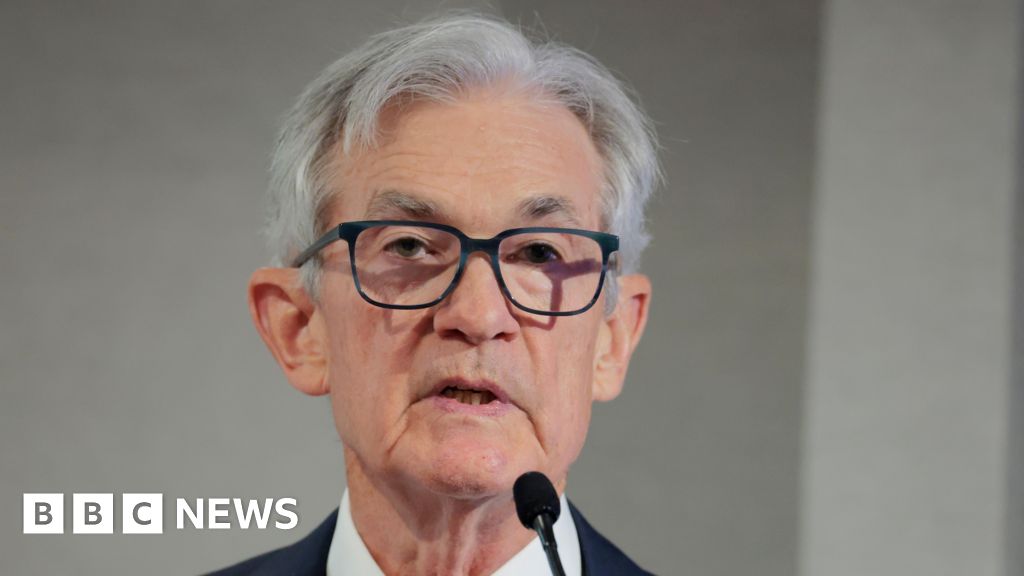US President Donald Trump says he has "no intention of firing" Jerome Powell after repeatedly criticising the Federal Reserve Chair. Speaking to reporters on Tuesday, Trump added he would like Powell to more proactively cut interest rates. Last week, the president intensified his of criticism of Powell, calling him "a major loser". That sparked a selloff of stocks, bonds and the US dollar, but the markets have since been recovering from those losses. The Federal Reserve has not cut rates so far this year, after lowering them by a percentage point late last year. It comes after the director of the National Economic Council Director Kevin Hassett said on Friday that Trump was looking into whether it would be possible to sack the Fed chief. Trump also told reporters he was optimistic about improving trade relations with China. He said he would be "very nice" in negotiations with Beijing and tariffs would fall if there was a deal, but not to "zero". Earlier, US Treasury Secretary Scott Bessent reportedly said he expected a de-escalation of the trade war with China, describing the current situation as unsustainable. After the remarks, major stock markets were higher in Wednesday morning trade. Japan's Nikkei 225 index was up about 1.9%, the Hang Seng in Hong Kong climbed by around 2.4%, while mainland China's Shanghai Composite edged 0.1% higher. On Tuesday, US stocks made gains, with the S&P 500 ending Tuesday's session up 2.5% and the Nasdaq rose 2.7%.
Trump says he has 'no intention of firing' Fed boss
TruthLens AI Suggested Headline:
"Trump Reaffirms Support for Fed Chair Powell Amidst Interest Rate Criticism"
TruthLens AI Summary
US President Donald Trump has publicly stated that he has 'no intention of firing' Jerome Powell, the Chair of the Federal Reserve, despite having voiced numerous criticisms of Powell's leadership. In remarks made to reporters, Trump expressed a desire for Powell to take a more aggressive approach in cutting interest rates, reflecting his ongoing frustration with the Fed's current monetary policy. Recently, Trump labeled Powell as 'a major loser,' a comment that contributed to a significant selloff in financial markets, including stocks, bonds, and the US dollar. However, following these tumultuous remarks, markets have begun to recover, indicating a potential stabilization in investor sentiment. Notably, the Federal Reserve has not made any interest rate cuts this year after a reduction of one percentage point late in the previous year, which has left many investors and analysts questioning the Fed's future moves in light of Trump's pressure.
In addition to his comments about the Federal Reserve, Trump also conveyed optimism regarding trade relations with China. He indicated that he would adopt a 'very nice' stance in upcoming negotiations, suggesting that while tariffs could decrease if a deal is reached, they would not be eliminated entirely. This sentiment aligns with the perspective of US Treasury Secretary Scott Bessent, who remarked on the unsustainable nature of the ongoing trade conflict with China and anticipated a de-escalation. Following Trump's statements, major global stock markets responded positively, with Japan's Nikkei 225 index rising by approximately 1.9%, the Hang Seng in Hong Kong increasing by around 2.4%, and the Shanghai Composite in mainland China edging up by 0.1%. In the US, the S&P 500 and Nasdaq also recorded gains, closing up 2.5% and 2.7%, respectively, signaling a rebound in market confidence amidst the unfolding economic discussions.
TruthLens AI Analysis
The article outlines President Donald Trump's comments regarding Federal Reserve Chair Jerome Powell, highlighting a complex interplay between political rhetoric and market reactions. Trump's statement of having "no intention of firing" Powell is juxtaposed against his previous criticisms, suggesting a strategic communication approach in managing both public perception and economic stability.
Market Reactions and Economic Implications
The timing of Trump's remarks coincides with market volatility, where his derogatory statements about Powell had previously led to a selloff in various financial instruments. Following Trump's recent comments, major stock indices showed recovery, indicating a possible rebound in investor confidence. This reflects how presidential commentary can significantly influence market behavior, highlighting the interconnectedness of political discourse and economic conditions.
Political Strategy and Messaging
Trump's optimistic stance on trade relations with China is part of a broader narrative aimed at reassuring both domestic and international stakeholders. By projecting a willingness to negotiate amicably, he seeks to alleviate fears surrounding the ongoing trade war, which has been characterized as "unsustainable" by Treasury Secretary Scott Bessent. This rhetoric is likely intended to stabilize markets and reinforce his administration's economic agenda.
Public Perception and Strategic Communication
The article could be interpreted as an attempt to shape public perception regarding the Federal Reserve's role and Trump's influence over it. By stating he does not intend to fire Powell, Trump may be seeking to avoid further destabilization of the markets, which could arise from perceived executive interference in monetary policy. This suggests an awareness of the delicate balance between political authority and economic independence.
Hidden Narratives and Broader Context
While the article focuses on Trump's statements, it may also divert attention from underlying economic challenges that remain unaddressed. The emphasis on Powell's tenure and trade negotiations could obscure discussions about inflation, unemployment, or fiscal policy, potentially leading to a narrower public discourse on critical economic matters.
Manipulation and Trust Issues
The language used in the article, particularly in framing Powell's leadership as "a major loser," raises questions about the manipulation of public sentiment. Such derogatory language could polarize opinions about the Federal Reserve and its leadership, potentially undermining trust in economic institutions.
In conclusion, this article presents a blend of political strategy and market analysis, revealing how Trump's communications are crafted to manage perceptions and economic responses. The manipulation potential appears moderate, primarily through the use of charged language and the framing of economic narratives.
